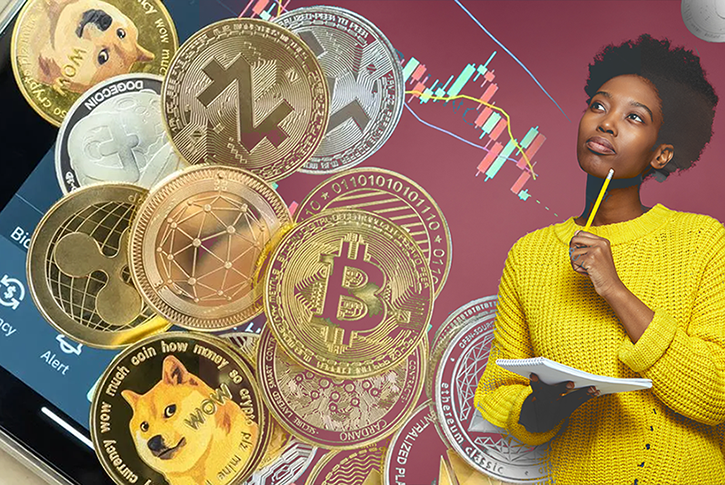
What Are Altcoins? A Beginner's Guide Beyond Bitcoin
Author Noella Lepdung
Altcoins in Nigeria: What They Are, Top Picks, and How to Invest Safely (2025 Guide)
The cryptocurrency world goes far beyond Bitcoin. While Bitcoin remains the pioneer of digital money, thousands of alternative cryptocurrencies—known as altcoins—have emerged to solve new problems and offer unique features.
For Nigerian investors exploring the crypto space, understanding altcoins is essential for making smart investment decisions.
Understanding Altcoins: The Basics
Altcoins (short for “alternative coins”) are all cryptocurrencies other than Bitcoin. Since the launch of the first altcoin, Namecoin, in 2011, the crypto market has expanded to over 16,000 different coins and tokens, each serving distinct purposes—from powering smart contracts to enabling fast payments or supporting decentralized apps (dApps).
Unlike Bitcoin, which mainly acts as a store of value, most altcoins are built to improve blockchain efficiency, scalability, or usability.
Why Do Altcoins Exist?
Many altcoins were created as direct alternatives to Bitcoin, addressing perceived limitations such as slow transaction speeds, high energy consumption, and limited functionality.
Some emerged from Bitcoin's blockchain through hard forks, while others built entirely new blockchain networks with different consensus mechanisms and use cases.
Major Types of Altcoins
Stablecoins
Stablecoins maintain a stable value by pegging their price to external assets like fiat currencies or commodities. Popular examples include USDT and USDC, which are pegged to the US dollar. These are particularly useful for Nigerian traders who want to protect their investments from extreme crypto volatility.
Utility Tokens
Utility tokens serve specific purposes within blockchain ecosystems. Ethereum (ETH) powers smart contracts and decentralized applications, while Binance Coin (BNB) reduces trading fees on the Binance exchange.
Privacy Coins
Privacy-focused altcoins like Monero and Zcash use advanced cryptography to protect user identities and transaction details, offering enhanced anonymity compared to Bitcoin.
Governance Tokens
These tokens allow holders to vote on protocol changes and influence the development direction of blockchain projects, democratizing decision-making within crypto communities.
Top Altcoins Nigerian Investors Should Know
|
Altcoin |
Primary Use |
Key Feature |
|
Ethereum (ETH) |
Smart contracts & DeFi |
Most widely used programmable blockchain |
|
Solana (SOL) |
High-speed transactions |
Low fees, ultra-fast processing |
|
Cardano (ADA) |
Sustainable blockchain |
Energy-efficient Proof of Stake |
|
Litecoin (LTC) |
Digital payments |
Faster transactions than Bitcoin |
|
USDT/USDC |
Stable value storage |
Pegged 1:1 to USD |
Altcoins vs. Bitcoin: The Key Differences
While Bitcoin operates solely on its own blockchain as a peer-to-peer payment system, altcoins often introduce additional functionalities. Some altcoins use different consensus mechanisms like proof-of-stake (PoS) instead of Bitcoin's energy-intensive proof-of-work (PoW), processing transactions faster and with lower fees.
Risks and Considerations for Nigerian Investors
Regulatory Uncertainty
Nigeria's evolving regulatory stance on cryptocurrencies affects altcoin participation. Nigerian crypto users have faced platform restrictions and access issues, which impact trading and investment opportunities.
Higher Volatility
Altcoins typically carry increased risks compared to Bitcoin, including higher volatility and lower liquidity. Research shows most altcoins fail within their first year.
Security Concerns
The altcoin space attracts fraudulent projects. Always verify project legitimacy, team credentials, and use cases before investing. Never share private keys, and use reputable exchanges for transactions.
How to Start with Altcoins in Nigeria
- Research thoroughly: Examine the project's whitepaper, development team, and real-world utility
- Choose trusted exchanges: Use established platforms with strong security measures
- Start small: Begin with small investments to understand market dynamics
- Diversify wisely: Don't put all funds into one altcoin
- Use secure wallets: Store significant holdings in cold wallets offline
Check current crypto rates on nairaCompare before making any purchase decisions.
Frequently Asked Questions
Q: Are altcoins legal in Nigeria?
Cryptocurrency trading exists in a gray area in Nigeria. While not explicitly illegal, Nigerian banks have restrictions on crypto transactions. Always stay informed about current regulations.
Q: Can I make money from altcoins?
Altcoins offer high growth potential but come with significant risks. Some investors have earned substantial returns, while others have lost their entire investment. Success requires thorough research and risk management.
Q: How do I buy altcoins in Nigeria?
Use international cryptocurrency exchanges that accept Nigerian users, or peer-to-peer platforms. First purchase Bitcoin or stablecoins, then exchange them for your desired altcoins.
Q: What's the best altcoin for beginners?
Established altcoins like Ethereum, Litecoin, or stablecoins like USDT offer relatively lower risk for beginners compared to newer, unproven projects.
Final Thoughts
Altcoins represent innovation and diversity in the cryptocurrency ecosystem, offering Nigerian investors opportunities beyond Bitcoin. However, the higher potential returns come with increased risks. Success in altcoin investing requires continuous learning, careful project evaluation, and disciplined risk management.
For Nigerians interested in exploring cryptocurrency opportunities, including crypto airdrops, staying informed about market trends and regulatory developments is crucial. Always invest only what you can afford to lose, and consider consulting financial advisors before making significant investment decisions.
Ready to explore the crypto market? Compare rates and start your journey at nairaCompare today.
About Author

Noella Lepdung
Noëlla Lepdung is a writer who makes magic with all sorts of content, helping businesses find their voice and meet their ambitions with cutting-edge but human-first advertising. Her portfolio features brands such as Budweiser, The Coca-Cola Company, Nivea, Leadway Group, Honeywell Foods, Monieworx, Kimberly-Clark, and WAMCO.






.png?width=352&name=Crypto%20Wallets%20in%20Nigeria%20Custodial%20vs%20Non-Custodial%20Explained%20(1).png)

.png?width=352&name=blog%20header%20(23).png)
